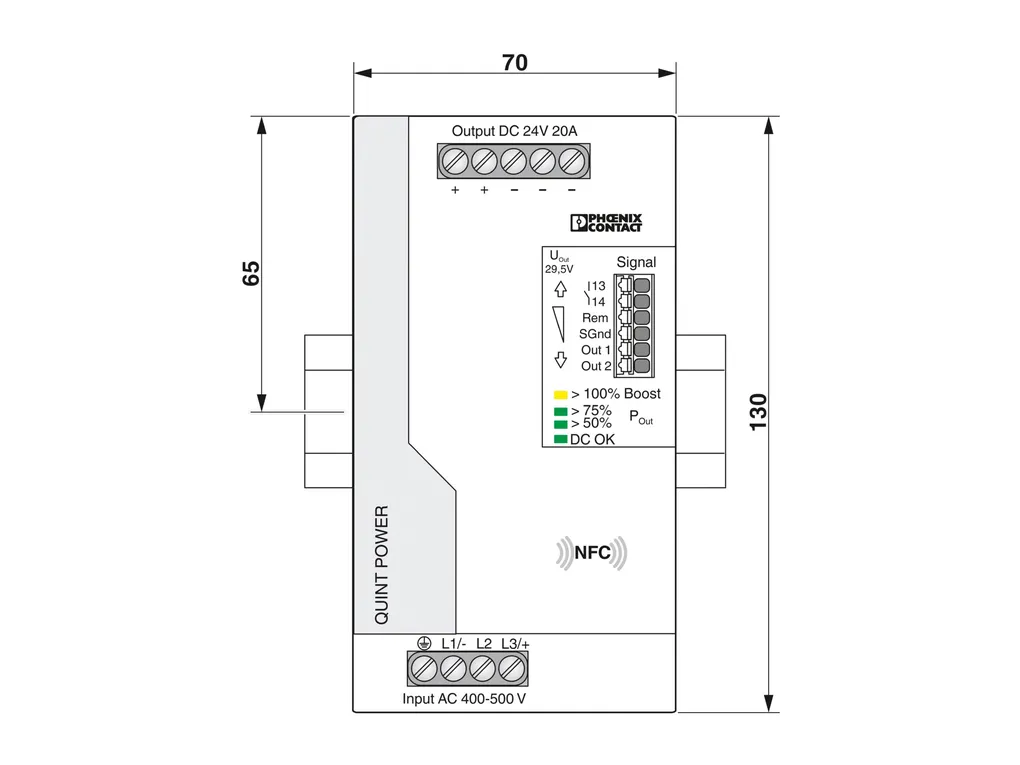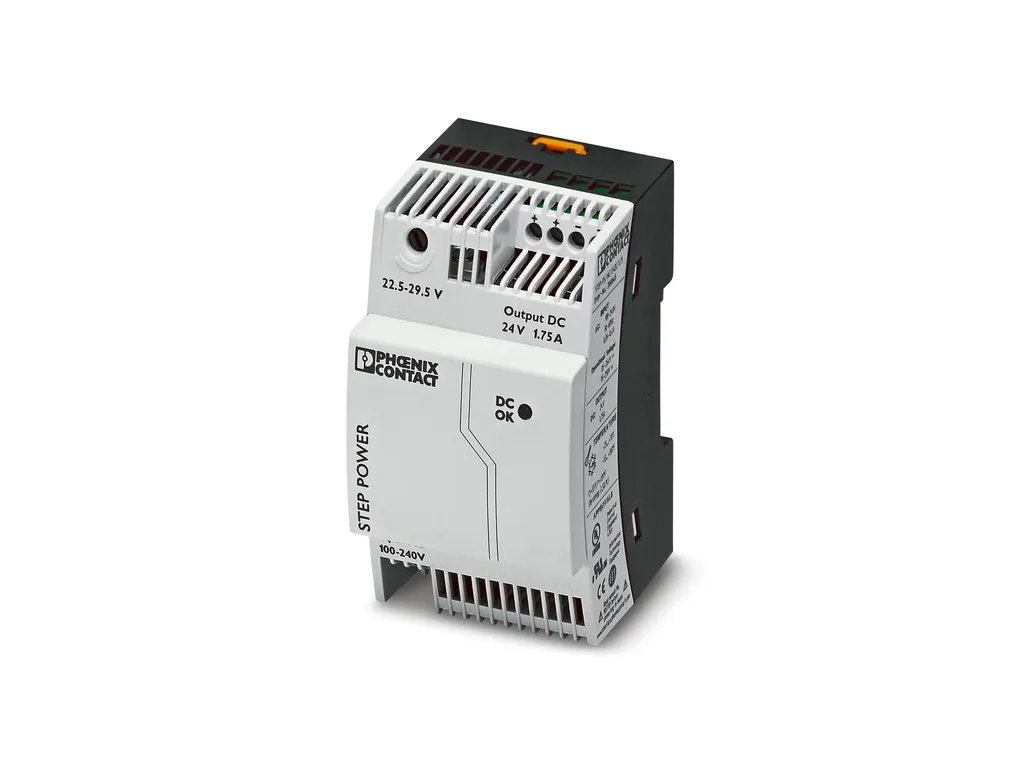| Input data | Control input (configurable) Rem: Output power ON/OFF (SLEEP MODE)
Default: Output power ON (>40 kââ¦/24 V DC/open bridge between Rem and SGnd)
AC operation
Network type: Star network
Nominal input voltage range: 3x 400 V AC ... 500 V AC
2x 400 V AC ... 500 V AC
Input voltage range: 3x 400 V AC ... 500 V AC -20 % ... +10 %
2x 400 V AC ... 500 V AC -10 % ... +10 %
Typical national grid voltage: 400 V AC
480 V AC
Voltage type of supply voltage: AC/DC
Inrush current: typ. 2 A (at 25 °C)
Inrush current integral (I2t): < 0.1 A2s
Inrush current limitation: 3 A (after 1 ms)
AC frequency range: 50 Hz ... 60 Hz -10 % ... +10 %
Frequency range (fN): 50 Hz ... 60 Hz -10 % ... +10 %
Mains buffering time: ââ°¥ 25 ms (3x 400 V AC)
ââ°¥ 25 ms (3x 480 V AC)
Current consumption: 3x 0.99 A (400 V AC)
3x 0.81 A (480 V AC)
2x 1.62 A (400 V AC)
2x 1.37 A (480 V AC)
3x 0.8 A (500 V AC)
2x 1.23 A (500 V AC)
Nominal power consumption: 541 VA
Protective circuit: Transient surge protection; Varistor, gas-filled surge arrester
Switch-on time: < 1 s
Typical response time: 300 ms (from SLEEP MODE)
Recommended breaker for input protection: 3x 4 A ... 20 A (Characteristic B, C or comparable)
Recommended fuse for input protection: ââ°¥ 300 V AC
Discharge current to PE: < 3.5 mA
1.7 mA (550 V AC, 60 Hz)
DC operation
Nominal input voltage range: ñ 260 V DC ... 300 V DC
Input voltage range: ñ 260 V DC ... 300 V DC -13 % ... +30 %
Voltage type of supply voltage: AC/DC
Current consumption: 1.23 A (ñ 260 V DC)
1.06 A (ñ300 V DC)
Recommended breaker for input protection: 1x 6 A (10 x 38 mm, 30 kA L/R = 2 ms)
Recommended fuse for input protection: ââ°¥ 1000 V DC
|
| Output data | Efficiency: typ. 93.9 % (400 V AC)
typ. 93.8 % (480 V AC)
Nominal output voltage: 26 V DC
Setting range of the output voltage (USet): 24 V DC ... 29.5 V DC (constant capacity)
Nominal output current (IN): 20 A
Static Boost (IStat.Boost): 25 A
Dynamic Boost (IDyn.Boost): 30 A (5 s)
Selective Fuse Breaking (ISFB): 120 A (15 ms)
Magnetic circuit breaker tripping: A1...A16 / B2...B13 / C1...C6 / Z1...Z16
Derating: > 60 °C (2.5 %/K)
Feedback voltage resistance: ââ°¤ 35 V DC
Protection against overvoltage at the output (OVP): ââ°¤ 32 V DC
Control deviation: < 0.5 % (Static load change 10 % ... 90 %)
< 3 % (Dynamic load change 10 % ... 90 %, (10 Hz))
< 0.25 % (change in input voltage ñ10 %)
Residual ripple: < 60 mVPP (with nominal values)
Short-circuit-proof: yes
No-load proof: yes
Output power: 480 W
600 W
720 W
Apparent power: 686 VA (400 V, UOUT = 24 V, IOUT = stat. Boost)
698 VA (480 V, UOUT = 24 V, IOUT = stat. Boost)
Maximum no-load power dissipation: < 7 W (400 V AC)
< 7 W (480 V AC)
Power loss nominal load max.: < 32 W (400 V AC)
< 33 W (480 V AC)
Power dissipation SLEEP MODE: < 5 W (400 V AC)
< 5 W (480 V AC)
Crest factor: typ. 1.78 (400 V AC)
typ. 2.1 (480 V AC)
Rise time: < 80 ms (UOut = 10 % ... 90 %)
Connection in parallel: yes, for redundancy and increased capacity
Connection in series: yes
Signal
Signal ground SGnd: Reference potential for Out1, Out2, and Rem
Signal Out 1 (configurable)
Digital: 24 V DC 20 mA
Default: 24 V DC 20 mA 24 V DC for UOut > 0.9 x USet
Signal Out 2 (configurable)
Default: 24 V DC 20 mA 24 V DC for POut < 0,8 PN and 3 AC OK
Signal relay 13/14 (configurable)
Default: closed (Uout > 0.9 USet)
Digital: 24 V DC 1 A
30 V AC/DC 0.5 A
|
| Connection data | Input
Connection method: Screw connection
Conductor cross section, rigid min.: 0.2 mm²
Conductor cross section, rigid max.: 6 mm²
Conductor cross section flexible min.: 0.2 mm²
Conductor cross section flexible max.: 4 mm²
Conductor cross section AWG min.: 30
Conductor cross section AWG max.: 10
Stripping length: 8 mm
Tightening torque, min: 0.5 Nm
Tightening torque max: 0.6 Nm
Output
Connection method: Screw connection
Conductor cross section, rigid min.: 0.2 mm²
Conductor cross section, rigid max.: 6 mm²
Conductor cross section flexible min.: 0.2 mm²
Conductor cross section flexible max.: 4 mm²
Conductor cross section AWG min.: 30
Conductor cross section AWG max.: 10
Stripping length: 8 mm
Tightening torque, min: 0.5 Nm
Tightening torque max: 0.6 Nm
Signal
Connection method: Push-in connection
Conductor cross section, rigid min.: 0.2 mm²
Conductor cross section, rigid max.: 1.5 mm²
Conductor cross section flexible min.: 0.2 mm²
Conductor cross section flexible max.: 1.5 mm²
Conductor cross section AWG min.: 24
Conductor cross section AWG max.: 16
Stripping length: 8 mm
|
| Signaling | Signal output
POut: > 100 % (LED lights up yellow, output power > 480 W)
> 75 % (LED lights up green, output power > 360 W)
> 50 % (LED lights up green, output power > 240 W)
UOut: > 0.9 x USet (LED lights up green)
< 0.9 x USet (LED flashes green)
|
| Electrical properties | Number of phases: 3.00
Insulation voltage input/output: 4 kV AC (type test)
2.4 kV AC (routine test)
Insulation voltage output / PE: 0.5 kV DC (type test)
0.5 kV DC (routine test)
Insulation voltage input / PE: 3.5 kV AC (type test)
2.4 kV AC (routine test)
Switching frequency: 90.00 kHz ... 110.00 kHz (Auxiliary converter stage)
56.00 kHz ... 500.00 kHz (Main converter stage)
25.00 kHz ... 500.00 kHz (PFC stage)
|
| Product properties | Product type: Power supply
Product family: QUINT POWER
MTBF (IEC 61709, SN 29500): > 985000 h (25 °C)
> 638000 h (40 °C)
> 311000 h (60 °C)
Environmental protection directive: RoHS Directive 2011/65/EU
WEEE
Reach
Insulation characteristics
Protection class: I
Degree of pollution: 2
Life expectancy (electrolytic capacitors)
Current: 10 A
Temperature: 40 °C
Time: 344000 h
Additional text: 400 V AC
Life expectancy (electrolytic capacitors)ââ¬Ã¢¹
Current: 10 A
Temperature: 40 °C
Time: 320000 h
Additional text: 480 V AC
Life expectancy (electrolytic capacitors)ââ¬Ã¢¹Ã¢Ã¢¬Ã¢¹
Current: 20 A
Temperature: 25 °C
Time: 445000 h
Additional text: 400 V AC
Life expectancy (electrolytic capacitors)ââ¬Ã¢¹Ã¢Ã¢¬Ã¢¹Ã¢Ã¢¬Ã¢¹
Current: 20 A
Temperature: 25 °C
Time: 432000 h
Additional text: 480 V AC
Life expectancy (electrolytic capacitors)ââ¬Ã¢¹Ã¢Ã¢¬Ã¢¹Ã¢Ã¢¬Ã¢¹Ã¢Ã¢¬Ã¢¹
Current: 20 A
Temperature: 40 °C
Time: 157000 h
Additional text: 400 V AC
Life expectancy (electrolytic capacitors)ââ¬Ã¢¹Ã¢Ã¢¬Ã¢¹Ã¢Ã¢¬Ã¢¹Ã¢Ã¢¬Ã¢¹Ã¢Ã¢¬Ã¢¹
Current: 20 A
Temperature: 40 °C
Time: 152000 h
Additional text: 480 V AC
|
| Dimensions | Dimensional drawing: https://caas.phoenixcontact.com/caas/v1/stable/media/170842/full/b1500?format=jpg
Width: 70 mm
Height: 130 mm
Depth: 125 mm
Installation dimensions
Installation distance right/left: 0 mm / 0 mm
Installation distance top/bottom: 30 mm / 30 mm
Alternative assembly
Width: 122 mm
Height: 130 mm
Depth: 73 mm
|
| Mounting | Mounting type: DIN rail mounting
Assembly note: alignable: PN ââ°¥50%, 5 mm horizontally, 15 mm next to active components, 50 mm vertically
alignable: PN <50%, 0 mm horizontally, 40 mm vertically top, 20 mm vertically bottom
Mounting position: horizontal DIN rail NS 35, EN 60715
With protective coating: no
|
| Material specifications | Flammability rating according to UL 94 (housing / terminal blocks): V0
Housing material: Metal
Hood version: Stainless steel X6Cr17
Side element version: Aluminum
|
| Environmental and real-life conditions | Ambient conditions
Degree of protection: IP20
Ambient temperature (operation): -25 °C ... 70 °C (> 60 °C Derating: 2,5 %/K)
Ambient temperature (storage/transport): -40 °C ... 85 °C
Ambient temperature (start-up type tested): -40 °C
Maximum altitude: ââ°¤ 5000 m (> 2000 m, observe derating)
Climatic class: 3K3 (in acc. with EN 60721)
Max. permissible relative humidity (operation): ââ°¤ 95 % (at 25 °C, non-condensing)
Shock: 18 ms, 30g, in each space direction (according to IEC 60068-2-27)
Vibration (operation): 5 Hz ... 100 Hz resonance search 2.3g, 90 min., resonance frequency 2.3g, 90 min. (according to DNV GL Class C)
|
| Standards and regulations | Rail applications: EN 50121-3-2
EN 50121-4
EN 50121-5
IEC 62236-3-2
IEC 62236-4
IEC 62236-5
HART FSK Physical Layer Test Specification Compliance: Output voltage UOut compliant
Standard ââ¬Ã¢ Electronic equipment for use in electrical power installations and their assembly into electrical power installations: EN 50178/VDE 0160 (PELV)
Standard ââ¬Ã¢ Limitation of mains harmonic currents: EN 61000-3-2
Standard - Electrical safety: IEC 60950-1/VDE 0805 (SELV)
Standard ââ¬Ã¢ Safety extra-low voltage: IEC 60950-1 (SELV) and EN 60204-1 (PELV)
Standard - Safe isolation: DIN VDE 0100-410
Standard - safety for equipment for measurement, control, and laboratory use: IEC 61010-1
Standard - Safety of power supply units up to 1100 V (insulation distances): DIN EN 61558-2-16
Standard - Safety of transformers: EN 61558-2-16 (air clearances and creepage distances only)
Standard - power supply devices for low voltage with DC output: EN 61204-3
Approval - requirement of the semiconductor industry with regard to mains voltage dips: SEMI F47-0706, EN 61000-4-11
Overvoltage category
EN 60950-1: II
EN 61010-1: II
EN 62477-1: III
|
| Approvals | CSA: CAN/CSA-C22.2 No. 60950-1-07
CSA-C22.2 No. 107.1-01
Shipbuilding approval: DNV GL, PRS, BV, LR, ABS
UL approvals: UL Listed UL 508
UL/C-UL Recognized UL 60950-1
UL ANSI/ISA-12.12.01 Class I, Division 2, Groups A, B, C, D (Hazardous Location)
|
| EMC data | Electromagnetic compatibility: Conformance with EMC Directive 2014/30/EU
Low Voltage Directive: Conformance with Low Voltage Directive 2014/35/EC
EMC requirements for noise emission: EN 61000-6-3
EN 61000-6-4
EMC requirements for noise immunity: EN 61000-6-1
EN 61000-6-2
Conducted noise emission: EN 55016
EN 61000-6-3 (Class B)
Noise emission: Additional basic standard EN 61000-6-5 (immunity in power station), IEC/EN 61850-3 (energy supply)
EN 55016
EN 61000-6-3 (Class B)
DNV GL conducted interference: Class A
Additional text: Area power distribution
Bridge and deck area
DNV GL noise radiation: Class B
Harmonic currents
Frequency range: 0 kHz ... 2 kHz
Flicker
Frequency range: 0 kHz ... 2 kHz
Electrostatic discharge
Standards/regulations: EN 61000-4-2
Electrostatic dischargeââ¬Ã¢¹
Contact discharge: 8 kV (Test Level 4)
Discharge in air: 15 kV (Test Level 4)
Comments: Criterion A
Electromagnetic HF field
Standards/regulations: EN 61000-4-3
Electromagnetic HF fieldââ¬Ã¢¹
Frequency range: 80 MHz ... 1 GHz
1 GHz ... 6 GHz
1 GHz ... 6 GHz
Test field strength: 20 V/m (Test Level 3)
10 V/m (Test Level 3)
10 V/m (Test Level 3)
Comments: Criterion A
Fast transients (burst)
Standards/regulations: EN 61000-4-4
Fast transients (burst)ââ¬Ã¢¹
Input: 4 kV (Test Level 4 - asymmetrical)
Output: 4 kV (Test Level 3 - asymmetrical)
Signal: 2 kV (Test Level 4 - asymmetrical)
Comments: Criterion A
Surge voltage load (surge)
Standards/regulations: EN 61000-4-5
Surge voltage load (surge)ââ¬Ã¢¹
Input: 3 kV (Test Level 4 - symmetrical)
6 kV (Test Level 4 - asymmetrical)
Output: 1 kV (Test Level 3 - symmetrical)
2 kV (Test Level 3 - asymmetrical)
Signal: 1 kV (Test Level 2 - asymmetrical)
Comments: Criterion A
Conducted interference
Standards/regulations: EN 61000-4-6
Conducted interferenceââ¬Ã¢¹
I/O/S: asymmetrical
Frequency range: 0.15 MHz ... 80 MHz
Comments: Criterion A
Voltage: 10 V (Test Level 3)
Power frequency magnetic field
Standards/regulations: EN 61000-4-8
Frequency: 16.67 Hz
50 Hz
60 Hz
50 Hz
60 Hz
0 Hz
Test field strength: 100 A/m
1 kA/m
300 A/m
Additional text: 60 s
3 s
DC, 60 s
Comments: Criterion A
Frequency range: 50 Hz ... 60 Hz
Voltage dips
Standards/regulations: EN 61000-4-11
Voltage: 400 V AC
Frequency: 50 Hz
Voltage dip: 70 %
40 %
0 %
Number of periods: 0.5 / 1 / 25 periods
5 / 10 / 50 periods
0.5 / 1 / 5 / 50 periods
Additional text: Test Level 2
Comments: Criterion A: 0.5 / 1 period
Criterion B: 25 periods
Criterion B
Criterion A: 0,5 / 1 period
Criterion B: 5 / 50 periods
Pulse-shape magnetic field
Standards/regulations: EN 61000-4-9
Test field strength: 1000 A/m
Comments: Criterion A
Attenuated sinusoidal oscillations (ring wave)
Standards/regulations: EN 61000-4-12
Input: 2 kV (Test Level 4 - symmetrical)
4 kV (Test Level 4 - asymmetrical)
Comments: Criterion A
Asymmetrical conducted disturbance variables
Standards/regulations: EN 61000-4-16
Test level 1: 50 Hz 60 Hz (Test Level 3)
Voltage: 10 V (Permanent)
100 V (1 s)
Test level 2: 0 Hz 16.67 Hz 50 Hz 60 Hz (Test Level 2)
Comments: Criterion A
Attenuated oscillating wave
Standards/regulations: EN 61000-4-18
Input/Output/Signal: 0.5 kV (Test Level 2 - symmetrical)
1 kV (Test Level 2 - asymmetrical)
Comments: Criterion A
Criteria
Criterion A: Normal operating behavior within the specified limits.
Criterion B: Temporary impairment to operational behavior that is corrected by the device itself.
Criterion C: Temporary adverse effects on the operating behavior, which the device corrects automatically or which can be restored by actuating the operating elements.
|
 Non disponibile
Non disponibile 





